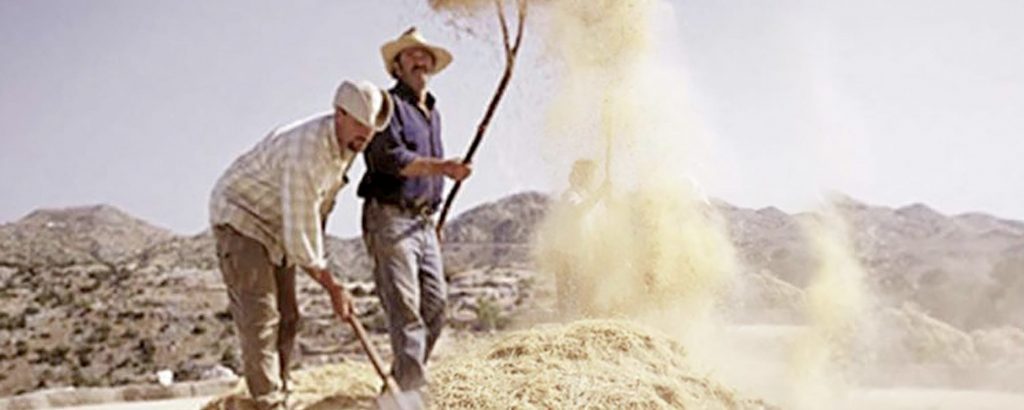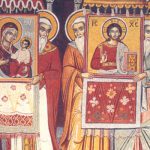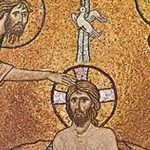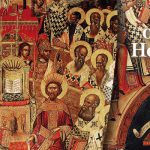
Coronavirus and holy Communion
Let everyone examine himself
With the pandemic of coronavirus the question has been raised whether holy Communion can transmit the virus, or any other epidemic. Orthodox theologians have given answers on both sides of the spectrum. We offer here a few brief reflections on this issue.
What is the Eucharist?
The faith of the Church since the beginning has been that what we receive in holy Communion is no less than the Body and Blood of our Lord, God and Savior Jesus Christ, as witnessed by the Apostle:
The Cup of blessing which we bless, is it not the Communion of the Blood of Christ? The Bread which we break, is it not the Communion of the Body of Christ? For we being many, are one Bread and one Body; for we all partake of that one Bread” (1 Cor. 10:16-17).
All three synoptic evangelists and the Apostle Paul attest to the establishment of the holy Eucharist by Jesus Christ (Mk. 14:22-25 and parallel, and 1 Cor. 11:23-26). The Lord established this Mystery to keep us united with Him, so by eating the Bread and drinking the Wine, we become members of His precious Body and Blood, and have His life in us.
Holy Communion is for members only. The Church is the Body of Christ and the holy Communion is Himself, in His entirety, communicating His Life to the members of His Body, keeping them alive as long as they remain attached to Him. All the members of this Body are nurtured by His Blood, as it happens in a human body.
Can the holy Communion spread disease?
Now to the question we posed at the beginning: can the holy Communion spread a disease, like the current epidemic of coronavirus? Let us once more repeat what we commune: the Body and Blood of our Lord Jesus Christ. Let us then compare His Body when He was on earth with His Eucharistic Body and Blood. We believe that Christ’s human Body had the same nature as our bodies, otherwise Christ would not have saved us. Still, while his humanity was the same, it was also different. We don’t walk on water (Mt. 14:25), we don’t calm storms with a command (Mt. 8:23-27), we don’t change water into wine (John 2:1-11), we are not conceived and born leaving our mother virgin (Is. 6:14), and we don’t rise from the dead by our own power, as Christ did (Lk. 24:6-8. cf. Mt. 28:6-8, Mk. 16:6). And in those cases when Saints have done the same, they did it by God’s grace, which overcomes the laws of nature (such incidents are called miracles).
Yet, certain authors point out that holy Communion, when left out for several days for the Presanctified Liturgies, can become moldy. So, they argue, if the immaculate Eucharistic Body of the Lord can develop mold, why couldn’t it also be carrier of a virus? Well, the nature of the bread is to mold under certain conditions. Even after the consecration, when it has become the Body of the Lord, the bread does not shed its nature. Yet, like the incarnate Christ, it acquires qualities that it did not have before. It can still get moldy or be consumed by fire, as Christ grew, suffered and died, but now it acquires the powers Christ’s body had, which were above nature. As Christ’s Body was deified when it was conceived by the Holy Spirit in the Virgin’s womb, so the same Holy Spirit descends and sanctifies the Bread and Wine, rendering them the Life-giving Body and Blood of the Lord.
But, someone could still object, if we receive the Holy Sacraments, which are the risen and glorified Lord, why do they spoil and corrupt, since Christ’s human nature after His resurrection and ascension to heaven is no longer subject to corruption? I believe this happens because they remain in our fallen world, as Christ was on earth. But while they function according to the laws of nature, they also operate beyond their created nature, acquiring the properties of the uncreated energy of God, and become a source of grace for the faithful. But that grace operates on us under conditions. They have the power, but it becomes effective with our faith.
Faith is needed
In last Sunday’s Gospel passage we read about the miraculous healing of the son with dumb spirit. The disciples were not able to cast it out (Mk. 9:18), although the Lord had given them that power (Mk. 6:7). The Lord said to the father of the child, “All things are possible to him who believes” (Mk. 9:23), and gave to His disciples, and us, a good lesson: faith is needed (v. 29). Nothing acts magically. Even the baptism does not give us salvation without faith: “Whoever believes and is baptized will be saved” (Mk. 16:16). On many occasions, after performing a miracle, the Lord said, “Your faith made you well.” (Mt. 8:13, 9:22, Mk. 5:34.10:52, Lk. 8:48, 17:19, 18:42 etc.)
The holy Gifts have all the power of Christ, but this power becomes effective according to our faith. Without faith it has no salutary effect, but, to the contrary, they may be to our detriment. How is this possible? The Apostle Paul warned the Corinthians (1 Cor. 11:27-30): what is received for life can be deadly, because the same Christ Who is Life for those who are united with Him, is death to those who are not:
Whoever eats the bread or drinks the cup of the Lord in an unworthy manner will be guilty of profaning the Body and Blood of the Lord. Let a man examine himself and so eat of the Bread and drink of the Cup. For any one who eats and drinks without discerning the Body of the Lord eats and drinks judgment upon himself. That is why many of you are weak and ill, and a number of you have fallen asleep.” [i.e. died]
He makes it very clear that some people who were receiving unworthily not only did not get well, but became sick and even died. Here is another example:
After the Lord has been around the country teaching and performing spectacular miracles, He visited His hometown. The Evangelist Mark notes: “And He could do no mighty works there, except that He laid His hands upon a few sick people and healed them. And He marveled because of their unbelief.” (Mk. 6:5-6. Cf. also Mt. 13:58)
Communion is for the healing of soul and body
Not to be overlooked, holy Communion is for the health of the body as well as the soul. The preparatory prayers express our anticipation of this bodily healing. In the very first hymn of the Communion Canon, recited on the eve of the day we intend to receive holy Communion, we pray:
O Compassionate Lord, may Your holy Body be for me the Bread of life eternal, and Your precious Blood be also a protection against many forms of illnesses.
Similarly, in a preparatory prayer by St. John Chrysostom (5th prayer), read on the morning of the day we intend to receive, we pray:
Lord Jesus Christ, my God… grant me to receive without condemnation Your spotless, immortal, life-giving and awesome Mysteries for the forgiveness of sins and life eternal, for sanctification and illumination, for strength and healing of soul and body…
After holy Communion, in a prayer of thanksgiving, the priest prays the following prayer:
We thank You, Lord, our God, for the communion of Your holy, most pure, immortal, and heavenly Mysteries which You have granted us for the benefit, sanctification, and healing of our souls and bodies. Grant, Master of all, that the communion of the holy Body and Blood of Your Christ may become for us faith unashamed, love unfeigned, fullness of wisdom, healing of soul and body, repelling of every hostile adversary, observance of Your commandments, and an acceptable defense at the dread judgment seat of Your Christ.
In the Divine Liturgy of St. John Chrysostom after “the Lord’s Prayer” the priest recites a prayer sotto voce calling upon God the Father to “heal the sick,” addressing Him as the “physician of our souls and bodies.” The Son of God did the same in His earthly sojourn: “Jesus was going through all the cities and villages… healing every kind of disease and every kind of sickness.” (Mt. 9:35. See also Mk. 1:34, Lk. 4:40.7:21 and Mt. 4:24)
We know that there have been many cases in the life of the Church of priests and deacons who were communing lepers and people with many infectious diseases, and who afterwards consumed the remainder portion of the divine Eucharist without any incidents. But one needs to have the faith. If not, yes, we can get sick from holy Communion—BUT NOT BECAUSE IT IS INFECTED, but because we are unworthy to receive it with unshakable faith and trust.
The test of our life
Perhaps this pandemic is a test of faith for the Orthodox people, and an occasion to separate the wheat from the chaff: “His winnowing fork is in His hand, and He will clear His threshing floor and gather His wheat into His granary, but the chaff He will burn with unquenchable fire.” (Mt. 4:12) Those who have a faith that transcends the rational mind are the good wheat, whereas those who do not understand the awesome and fearful mystery they partake of (or choose not to partake of), subject themselves to the consuming fire of God.
At every Liturgy the Church invites the faithful to approach and receive, but only if they have “fear of God, faith and love” (“and love” is a late addition, which should not take away from the awesomeness of the Divine Mysteries). The Apostle to the Nations warns us:
For you have not come to what may be touched…but you have come to… the heavenly Jerusalem… and to the assembly of the first-born… and to Jesus, the mediator of a new covenant, and to the sprinkled blood… See that you do not refuse Him who is speaking. For …we shall not escape if we reject Him who warns from heaven… Therefore …let us offer to God acceptable worship, with reverence and awe, for our God is a consuming fire. (Heb. 12:18.22-25.28.29)
Even if we receive the immaculate Sacraments after someone with the virus has received, we will not be harmed. Here is an example:
A leper approaches the Lord and tells Him: “Lord, if You will, you can make me clean.” And He stretched out His hand and touched him saying, “I will; be clean.” And immediately his leprosy was cleansed. (Mt. 8:2-3. Cf. also Mk. 40-45 and Lk. 5:12-14)
Obviously, the Lord did not think twice about touching the leper. Would we then hesitate to touch the Lord afterwards from fear we might get the disease? It is the same with holy Communion. We approach Him without fear of being infected by the coronavirus or any other disease.
If, having considered all things, holy Communion is not perceived as a “medicine of immortality,” a source for healing of soul and body, but doubts and fears rise in our minds, then we face the test of our life: Do we really have faith? Do we trust in the Lord?
Let us pray:
O Compassionate Lord, Physician of our souls and bodies, You Who cast down and raise up, Who chastise and Who also heal; do You now, in Your great mercy, visit us all who are infirm; stretch forth Your healing hand, and strengthen our weak faith, and cure us from our spiritual and bodily illness, through the intercessions of Your most holy Mother and of all the Saints. Amen.
Recommended readings, as a complement to my humble thoughts:
- “Coronavirus and the Chalice: Can you get sick, or not?” by Constantine Shmlyuk. (3/24/2020)
- “Orthodox Church Teaching on Whether There is a Danger of Spreading Disease Through Holy Communion, Kissing the Hand of the Priest, or Our Presence in the Holy Temple of God” by Metropolitan of Edessa, Joel. (3/28/2020)



Father, bless!
Never, ever, even in my darkest dreams, would I have imagined that this epidemic would be an excuse for so many to blaspheme the Holy Mysteries. I’m not surprised by those outside the Church, but to read that a priest argued it is a heresy to believe what the Church has always believed — this is a disgrace and beyond imagination.
I agree wholeheartedly with Metropolitan Joel of Edessa, including point 4.c. In my country, the services continue behind locked doors, without the people. Priests may only administer Holy Communion at home or in hospitals to those who are in danger of dying. The reactions have not been of the best kind, or so I’ve been told. Thankfully, I don’t have Facebook and I didn’t have to read them myself.
P.s. I missed, in the second paragraph, a phrase about how this position of Metropolitan Joel is key to a peaceful, dispassionate acceptance of emergency measures. Also, this text shows that one needs not blaspheme when arguing in favor of accepting decisions of the secular state.